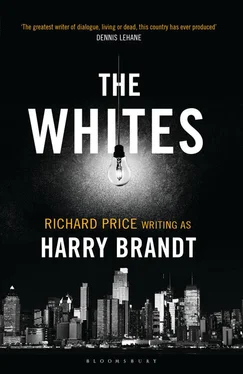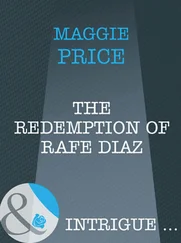In the end, she needn’t have tried so hard. One week earlier, the Post had lost out to the Daily News on the suicide of a retired police lieutenant in a Queens dope motel, and her editors were hot to get back on top. The story was page one for two days running, so when it all fell apart shortly after, everyone involved got scorched, but no one as badly as Stacey. In the end it came down to those background checks: in her anxiety about losing her scoop to the time-sucking demands of a thorough vetting of her sources, she hadn’t done them at all.
The real background checks — conducted, embarrassingly enough, by the Daily News —revealed that one of the on-record eyewits was the brother of a heroin dealer Billy had sent upstate, while the other had twice before born false witness against cops as payback for his own slew of arrests in that precinct. As for the two others who would only talk off the record, no one had seen them since the article hit the stands.
With Stacey caught flat-footed in her lie, and with no hard evidence to back up her account, the story was quickly buried, although never retracted. Within the week she was out the door, the story behind her story having become its own newsworthy story, the subject of self-examining op-ed pieces across the country and not a few panel discussions.
Excoriated for unhesitatingly scuttling a good cop’s reputation to further her own, emotionally whittled to a nub by her disgrace, and unable to support herself even if she chose to make a stand, Stacey moved back in with her parents in Rochester. With her father’s help, she became a part owner of a food truck christened My Hero, which was more or less permanently stationed across the street from the SUNY Brockport dormitory complex. After two years of full-time sandwich making in this drizzly exile, she endured another blow when both her parents died in a collision with an ambulance at an intersection three blocks from home. She spent the first two weeks after the funeral living alone in their house hoping for a visitation, then put it on the market. A few months later, temporarily flush with the proceeds of the sale, a small inheritance, and the buyout money she received from selling her share of My Hero, she quietly returned to the city.
Unable to find work as a reporter but banking on the skills she had developed as one, she reinvented herself as a private investigator, earning just enough to take a lease on a one-bedroom walk-up near Columbia University. For a while she held on to the hope of finding her way back into the newspaper business, but that pipe dream came to an end the day she accepted an invitation to address an Ethics and Ambition seminar in the university’s J-school, the experience leaving her feeling like a still-sentient cadaver picked over by medical students in an anatomy class.
Rather than enjoying the poetic justice of Stacey’s downfall, Billy felt torn — no, actually sorry for her, mostly ignoring the fact that she had tried to advance her career on his broken back. In fact, he had been the one to make the first move, reaching out to her with an e-mail a year after she returned to the city, and since then they had gradually, cautiously become friends. For her part, Stacey had been both astonished and humbled by his lack of vindictiveness, never once imagining that his gentle overture was motivated by anything other than old-time Christian compassion.
When Billy finally got it up to enter the diner, he spotted her at once, sitting at a booth in the back — north of forty now, too thin, too much wine, too much late-night TV — paradiddling an unlit cigarette against the Formica and reading the paper that had shit-canned her eighteen years ago for getting it all wrong about Billy and the shooting. She was wearing a ribbed turtleneck that made her look even bonier than she was and accentuated her slightly scoliotic posture. Her hair, a blond so ashy that it was impossible to tell how gray it might be turning, was pulled back in a short, rubber band — bound ponytail, and her watchful eyes were, as always, a little too quick, as if she were jonesing for something she couldn’t have. She’d been a golden girl once, and she took her tumble hard.
“Hey, how’s it going,” Billy said as he took a seat.
“The meat’s so tough that it got up off the plate and beat the shit out of the coffee, which was too weak to defend itself.”
“No kidding.”
“The PI business sucks. I hate the people who hire me, and I hate the people they want found.”
“I hear you.”
“Never serve a subpoena on a guy holding a pan of bacon. I put up my arm to protect my face and ruined a perfectly good North Face coat.”
“Good thing it was a cold day,” he said mildly, then, wanting her to get to it: “So…”
“I’m back to writing.”
“For money?”
“Not much, but you bet.”
“Good for you.” This could take a while.
“I’m writing an online sex column.”
“A what?”
“For this e-zine, Matterhorn .”
“What’s an e-zine?”
“Don’t worry about it — my nom de plume is Lance Driver.”
“A guy?”
“A guy advising other guys.”
“Wow, that’s…”
“Yesterday I advised some moke that if your girlfriend wants to stick a finger up your ass it doesn’t mean she thinks you’re a fag.”
“No?”
“It means she’s curious, she wants to know your body.”
“OK,” Billy said. “How far up?”
Stacey finally lit her cigarette, took a quick drag, and then put it out before they could arrest her.
“I draw the line at the first knuckle.”
“OK,” shifting in his seat. “So what did you want to talk to me about?”
“I have a new boyfriend.”
“Oh yeah?”
“I’m forty-five and I have a boyfriend, he’s fifty-seven and he has a girlfriend. I mean, what the fuck, right?”
Whatever it was that she had to share, it was making her very nervous, although calling Stacey nervous was like calling water wet. When she was in a state like this it was cruel to rush her.
“The boyfriend, what’s he do?”
“He edits Matterhorn .”
“He’s good to you?”
“That’s a very considerate question.”
“Yes? No?”
Stacey looked off. “He’s no stranger to the vine.”
“How much?”
“Two bottles, maybe a little more. He’s a sweet drunk, but it’s like talking to a small child towards the end of the evening.”
“Did you try AA?”
“I can’t even get him to Triple A.”
“He’ll lose you.”
“He’ll die is what he’ll do.”
“Threaten to walk out.”
“I don’t want to.”
“Threaten?”
“Walk out. I haven’t had a boyfriend in eight years. I like caring about what I look like again. I like being spooned.”
“Sounds like a problem there, Stace.”
The waiter finally came over, the guy sporting a reddish-gray comb-over and an apron up to his sternum.
“Try the grape jelly omelet.” Stacey coughed. “It’s excellent.”
“Just coffee.” Then, turning back to her: “Not that I don’t enjoy seeing you, but why am I here?”
“Are you ready for this?”
Billy waited.
“You remember Memori Williams had this twin sister?”
“Shakira, right?” Billy took one of Stacey’s cigarettes; this couldn’t be good.
“Shakira Barker. How twins can have different last names I’ll never understand.”
Billy envisioned that couch in the living room again, Memori’s head in Tonya Howard’s lap, the entry wound above her right eye like an erupted raspberry.
“Last I heard, Shakira was doing better,” he said hopelessly, “taking one of those mothering classes from the Children’s Initiative.”
Читать дальше












